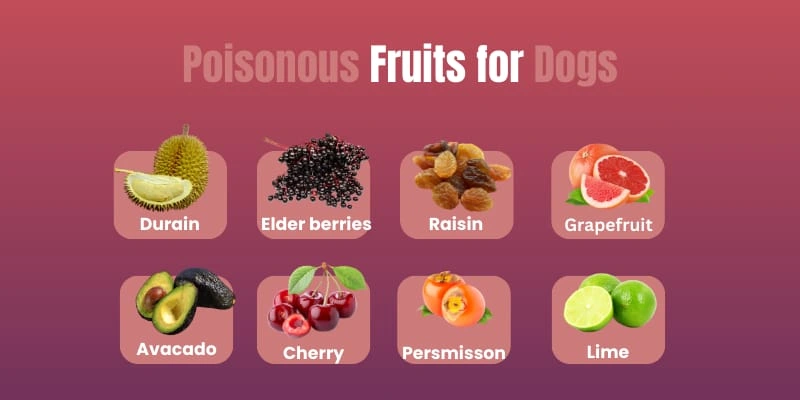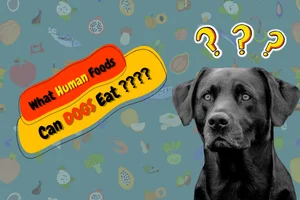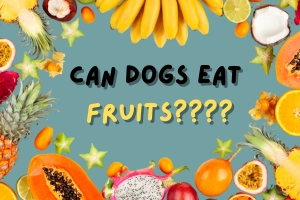Toxic Foods For Dogs – Learn What To Avoid
Published: 2 Nov 2024
Did you know that some foods we love can make our dogs really sick? Sounds scary, right? Most human foods can cause serious health issues like kidney failure or nerve damage in dogs. So, as dog owners, it’s our duty to know about all the foods that can be harmful in order to keep our dogs happy and healthy.
So, how would you know which ones are toxic? Don’t worry—we’re here to help. In this article, we will explore all toxic foods for dogs. I’ll explain why they are toxic and what to do if your dog eats them.
Let’s dive in and learn how to protect our pets!
Toxic Fruits for Dogs
It’s mind-blowing to know that certain fruits we enjoy can harm dogs. Here’s the list of poisonous fruits for dog which we need to avoid:
- Grapes and Raisins
- Avocados
- Cherries
- Damsons
- Citrus Fruits (lemons, limes, oranges, grapefruits)
- Elderberries
- Durians
These fruits contain compounds like persin (in avocados), psoralen and limonene (in citrus fruits), and cyanide (in elderberries and cherries) that are toxic to dogs.
These toxins can harm their organs, cause digestive issues, or lead to severe health problems. Even non-toxic fruits can pose risks like choking or upset stomachs if consumed in large quantities.
Learn details on the risks of toxic fruits here!

Toxic Vegetables for Dogs
Like some fruits, many common vegetables can also be dangerous for dogs. Here’s what to avoid:
- Onions
- Garlic
- Chives
- Leeks
- Raw Potatoes
- Wild Mushrooms
- Rhubarb
- Unripe Tomatoes
These seemingly healthy foods contain compounds like oxalate (in rhubarb), solanine (in raw potatoes), or oxalic acid (in rhubarb), which are deadly for dogs. These substances can damage red blood cells, harm the nervous system, or cause digestive distress. Learn details on the risks of toxic vegetables here!

Toxic Nuts for Dogs
Due to limited digestive enzymes, dogs cannot digest some nuts, and this causes poisoning in dogs. Here’s the list of nuts to avoid:
- Macadamia Nuts
- Pine Nuts
- Gingko Nuts
- Hickory Nuts
- Walnuts
- Beech Nuts
- Pecans
- Almonds (in large amounts)
Certain nuts contain poisonous compounds like juglone and tremorgenic mycotoxins that can cause serious health issues in dogs. These toxins can affect the nervous system, lead to digestive upset, or even cause muscle tremors.
| Did You Know?? |
|---|
Studies have shown that juglone is present in considerable amounts in all green and growing parts of trees and the unripe hulls of nuts. |
Learn details on the risks of toxic nuts here!
Toxic Proteins for Dogs
Although most proteins are safe for dogs, certain kinds of proteins should be avoided because they can contain harmful bacteria or toxic compounds that cause severe health issues. These can lead to digestive upset, infections, or even organ damage.
Here are the dangerous proteins to avoid:
- Raw Meat
- Fatty Meats
- Bones
- Raw Fish
- Raw Eggs
- Processed Meats (e.g., sausage, bacon)
- Spoiled Meat
- Certain Shellfish (like raw shrimp or crab)
Learn details on the risks of toxic proteins here!
Toxic Dairy for Dogs
Certain dairy products can harm dogs, even though they may seem like a treat. Here’s the list of dairy products that are toxic for our pets:
- Milk (for lactose-intolerant dogs)
- Cheese (especially high-fat varieties)
- Chocolate
- Yoghurt with added sugars or xylitol
- Ice Cream (with xylitol or high sugar content)
- Sour Cream
Many dogs are lactose intolerant, means they cannot digest lactose, a sugar in milk. Consuming dairy can lead to digestive problems, such as diarrhea, bloating, or stomach cramps. Some dairy products also contain high fat levels, which can cause more severe issues.

Learn details on the risks of toxic dairy here!
Alcohol
Alcohol is extremely dangerous for dogs. Even small amounts can be deadly. Alcohol consumption can result in vomiting, diarrhea, difficulty breathing, and potential coma.
What Makes Certain Foods Toxic to Dogs?
You might wonder why these compounds that are safe for humans are deadly for dogs. You must know that dogs process food differently than humans do.
- Dogs’ digestive systems are designed for meat-based diets, with a shorter tract and faster digestion. Unlike humans, dogs lack some digestive enzymes, such as amylase in saliva, which makes them less efficient at digesting grains, sugars, and other carbohydrate-rich foods.
- Dogs metabolize some substances much slower than we do, allowing toxins to build up and cause harm more easily. Their metabolism is adapted to derive nutrients from animal proteins and fats, making some human foods indigestible or even toxic for them.
| How Toxins Affect Dogs? |
|---|
|
Symptoms of Toxic Food Ingestion In Dogs
If your dog eats something toxic, they may show signs of poisoning. It’s important to recognize these symptoms so you could take actions quickly. Watch for these signs:
- Vomiting or diarrhoea
- Drooling or foaming at the mouth
- Blood in stool
- Lethargy or weakness
- Loss of appetite
- Shaking or seizures
- Trouble breathing
- Uncoordinated movements or staggering
What to Do If Your Dog Eats Toxic Food?
The first thing you need to do if your dog eats something harmful is to stay calm. Then, follow these steps:
- Remove any remaining toxic food from your dog’s reach.
- Watch your dog for any symptoms of poisoning.
- If you suspect any symptom, Call your vet or a pet poison control hotline immediately and ask for help.
- Follow your vet’s instructions exactly. In some cases, they may suggest inducing vomiting or bringing your dog in for treatment.
- Only try home remedies with vet approval, as some may make things worse.
| Importat Note |
|---|
I, Dr. Musky Abal, as an experienced veterinarian and dog food specialist, recommend that even if your dog seems fine, but you know they’ve eaten something toxic, take them to the hospital immediately. Early treatment can make a big difference in preventing serious health issues. |
Prevention Tips
Preventing your dog from eating toxic foods is the best way to keep them safe. Here are some simple tips to help:
- Keep toxic foods and substances out of reach in cabinets or sealed containers.
- Monitor your dog during meals and snacks to ensure they don’t get into anything harmful.
- Make sure everyone in your home knows which foods are toxic to dogs. This way, they won’t accidentally feed them harmful foods.
- Use dog-proof trash cans or keep garbage out of your dog’s reach, as leftovers or spoiled food can be dangerous.
- Many holiday foods, like chocolates and fatty foods, can harm dogs, so be extra careful during gatherings.
These simple steps can help create a safe environment for dogs and prevent accidents!
Safe Alternatives to Human Foods
Instead of feeding your dog foods that might be toxic, here are some safe and healthy alternatives that dogs love:
- Carrots – Crunchy and great for their teeth.
- Pumpkin – Helps with digestion and is low in calories.
- Peanut Butter (unsweetened, no xylitol) – Dogs love it, and it’s a great treat for hiding pills.
- Plain, boneless, cooked chicken – A simple, lean protein that dogs enjoy.
- Green Beans – Low in calories and high in vitamins.
- Sweet Potatoes – Full of vitamins and great for digestion.
- Bananas – A nutritious snack in moderation, providing potassium and fiber.
- Cucumbers – A hydrating, crunchy snack with low calories.
These alternatives keep your dog happy and healthy while avoiding the risks of toxic foods!
Conclusion
Ok, guys, it’s time to close up. Here’s the general overview of the points we discussed about toxic foods for dogs:
- Many human foods, such as grapes, onions, chocolate, and raw meat, are toxic for dogs and should be avoided.
- Watch for signs of poisoning, such as vomiting, weakness, or seizures, and contact your vet immediately if your dog eats something harmful.
- Prevent accidents by keeping dangerous foods like nuts, dairy, and fatty meats out of reach, and educate everyone in your home about the risks.
- To keep your dog healthy and happy, stick to safe alternatives like carrots, peanut butter, and plain cooked chicken.
Protecting your dog from toxic foods is crucial for their health and well-being. You can easily keep your dog safe and happy by staying informed and making smart food choices.
Has your dog ever eaten any toxic food, and how did you handle it? Please share your experience in the comments so that other could learn from you.
FAQs
Look for signs like vomiting, diarrhoea, drooling, lethargy, or difficulty breathing. Symptoms can vary depending on the toxic food. If your dog suddenly shows unusual behaviour or physical symptoms, they may have eaten something harmful.
Yes, some breeds may be more sensitive due to their genetic makeup or size. Smaller breeds tend to be at greater risk because even small amounts of toxic foods can greatly impact them. Always consult your vet about specific breed sensitivities.
No, dogs cannot build immunity to toxic foods. In fact, repeated exposure to harmful substances can lead to worsening symptoms or long-term health issues.
While some dogs may show fewer symptoms, this doesn’t mean the food is safe. Every dog is different, but toxic foods can cause hidden damage to their organs, even if symptoms aren’t immediately visible. It’s best to avoid all toxic foods, regardless of tolerance.
If your vet instructs you to induce vomiting, they may recommend using hydrogen peroxide. Only do this with veterinary advice, as it can be dangerous. Always follow your vet’s instructions carefully to ensure your dog’s safety.
Some foods contain compounds that are only harmful when consumed in large quantities. For example, cranberries are safe in moderation but can cause issues in large amounts. Dogs metabolize food differently, so the buildup of these compounds can lead to toxicity.
Symptoms can appear within minutes to hours, depending on the food and how much your dog ate. Some toxins, like chocolate, may show effects quickly, while others, like grapes, might take several hours. Always monitor your dog closely if you suspect ingestion.
After removing any toxic food from your dog’s environment, offer plenty of water to help flush their system (unless your vet advises otherwise). Stick to safe foods like plain cooked chicken, carrots, or rice while monitoring for symptoms.
Yes, some surprising examples include grapes, raisins, macadamia nuts, and xylitol (found in sugar-free products). Even small amounts of these can be dangerous. Always check ingredients before sharing food with your dog.
If your dog experiences diarrhea, gas, or bloating after consuming dairy, they may be lactose intolerant. Many dogs lack the enzyme needed to digest lactose, so it’s best to avoid giving them milk-based products.
Even if your dog seems fine, toxic foods can cause hidden damage to organs like the liver, kidneys, or nervous system. Long-term effects could include digestive issues, organ failure, or decreased energy. It’s essential to consult your vet for a thorough evaluation.
Yes, household items like cleaning products, medications, certain plants (e.g., lilies), and even certain essential oils can be toxic to dogs. Keep harmful substances out of reach and dog-proof your home to prevent accidental poisoning.

- Be Respectful
- Stay Relevant
- Stay Positive
- True Feedback
- Encourage Discussion
- Avoid Spamming
- No Fake News
- Don't Copy-Paste
- No Personal Attacks

- Be Respectful
- Stay Relevant
- Stay Positive
- True Feedback
- Encourage Discussion
- Avoid Spamming
- No Fake News
- Don't Copy-Paste
- No Personal Attacks





